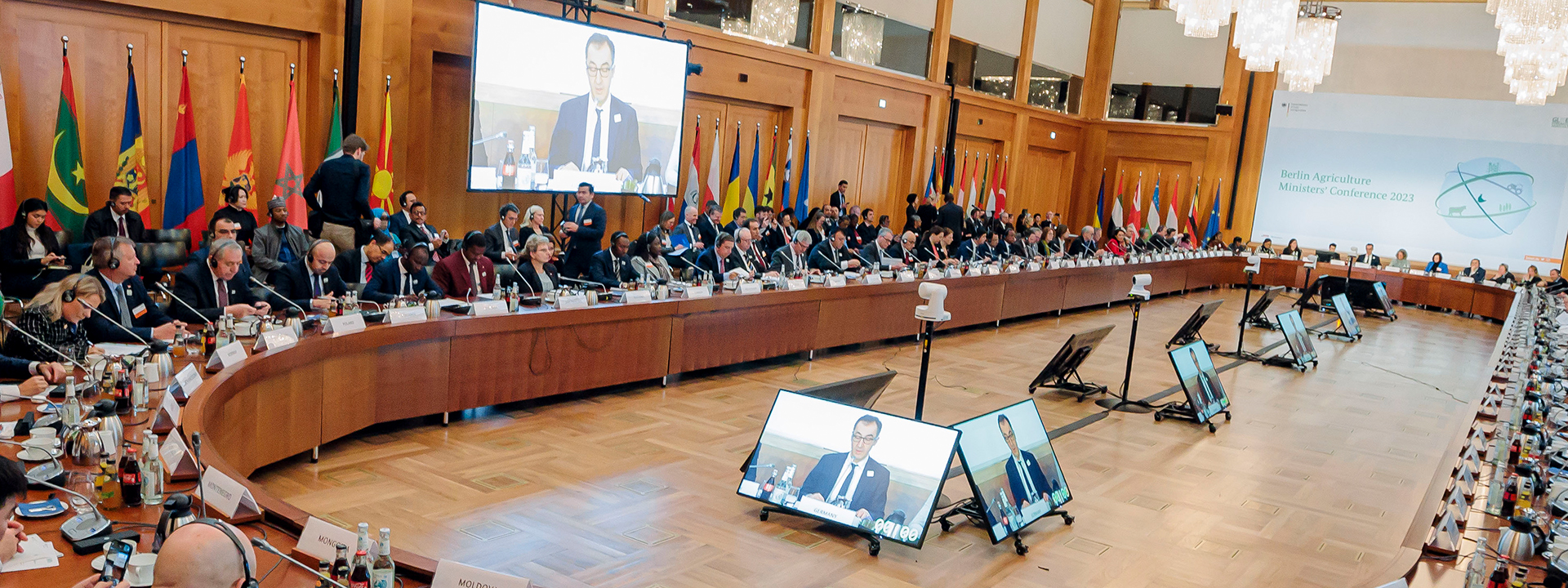

The number of people affected by hunger is continuing to rise. In 2021, between 702 and 828 million people in the world suffered from hunger, 46 million more people than in 2020 and 150 million more people than in 2019. In addition to the climate crisis, the extinction of species and the COVID-19 pandemic, the Russian war of aggression against Ukraine has become a new driving force in this crisis of global food security. The world is currently facing the worst food crisis since World War II.

They adopted a joint communiqué which can be downloaded here in German and English.
The joint communiqué of the Agriculture Ministers includes unambiguous wording on the Russian war of aggression against Ukraine and the resulting global food insecurity. The Ukranian President Volodymyr Zelenskyy called upon the Agriculture Ministers to support the Grain for Ukraine initiative.
The Ministers of Agriculture agree on the following:
The Berlin Agriculture Ministers‘ Conference is the political highlight of the GFFA. Over four days, thousands of high-level policy-makers, entrepreneurs and representatives from civil society met again face to face for the first time since 2020. They discussed key questions of global food and agriculture at the leading global conference on this issue.
Parliamentary State Secretary Dr. Ophelia Nick opened the conference on 19 January.
“Food Systems Transformation: A Worldwide Response to Multiple Crises”: Under the title of the event, experts discussed how global food security may be achieved in face of the multiple crises.
Aktivierung erforderlich
Wir möchten Sie darauf hinweisen, dass nach der Aktivierung Ihre Daten an Youtube übermittelt werden.
Aktivierung erforderlich
Wir möchten Sie darauf hinweisen, dass nach der Aktivierung Ihre Daten an Youtube übermittelt werden.
Aktivierung erforderlich
Wir möchten Sie darauf hinweisen, dass nach der Aktivierung Ihre Daten an Youtube übermittelt werden.
Turkana County – and other parts of the Horn of Africa – have suffered 4 consecutive failed rainy seasons. The drought is killing crops – there is no pasture for the livestock and water sources are drying up everywhere.
The ongoing emergency in the Horn of Africa is depriving children of clean, fresh water, of food, or livelihoods, and access to life-saving health services.
It is keeping them from the classroom, and forcing their families to move.
The climate crisis is not just robbing them of their futures.
It is robbing them of their present.
It is robbing them of their very survival.
Over those days, I spent time with people who have done literally nothing to create the climate crisis – but who are suffering its worst impacts.
I spent time with mums who are desperately trying to keep their young ones alive – trying to find food and water to sustain their families’ lives for another week, another day – another hour.
I spent time with their children who are clinging to life.
Often we are given statistics.
In the run up to this forum, the Federal Ministry of Food and Agriculture stated that in 2021, between 702 and 828 million people in the world suffered from hunger.
Statistics are important.
But we must remember we are not just talking about statistics.
We are here to talk about real people.
I want to tell you about one of the people I had the chance to meet while I was in Turkana County with UNICEF.
I met a young boy in a hospital where the worst cases of severe acute malnutrition are referred and treated.
It was devastating for me to see, especially when there are available solutions that can be put in place to stop children from suffering like this.
Unfortunately, this child’s family was not able to access the proper services in time for him to receive the treatment that he needed.
By the time the sun set that evening, sadly, he had passed away.
This is one story about how the climate crisis is affecting people all around the world – especially in the Global South.
This is the face of the climate crisis.
The climate crisis is not some distant, future threat.
I want to speak directly now to the agriculture ministers who are gathered here.
There is not much time left to reach the United Nations Sustainable Development Goal of “zero hunger”.
The year 2030 is only eight harvests away.
But the mums and children that I met in the Horn of Africa – and the millions of people on the frontlines of the climate crisis all around the world – do not have until 2030.
People – real people – are starving.
They need your help.
They need you to take action.
And they need you to do it now.
Thank you
Seite empfehlen

